CyberGhost or IPVanish? Which VPN is better and why? Well, we guess it’s been your dilemma for days now. We’re talking about two rather affordable providers that built their reputation on reasonable pricing while providing obvious qualities.
IPVanish is a US provider with thousands of servers and seemingly rock-solid security. Then, we have CyberGhost with nearly 5 times more servers, friendly logging practices, and solid streaming/torrenting optimization. Of course, these aren’t all the features – we’re just giving you a brief overview.
For our IPVanish vs CyberGhost comparison to be complete, we need to go over way more tests and analyses. To be precise, both services will go through 9 tests before we divulge our results. They will include compatibility, speeds, streaming, privacy, security, pricing, and much more.
In the very end, we promise to give you the answer to your question of whether to buy CyberGhost or IPVanish. Before that happens, you’ll need to read the entire thing because some things will surprise you. You don’t want to buy a VPN without knowing all about it, right?
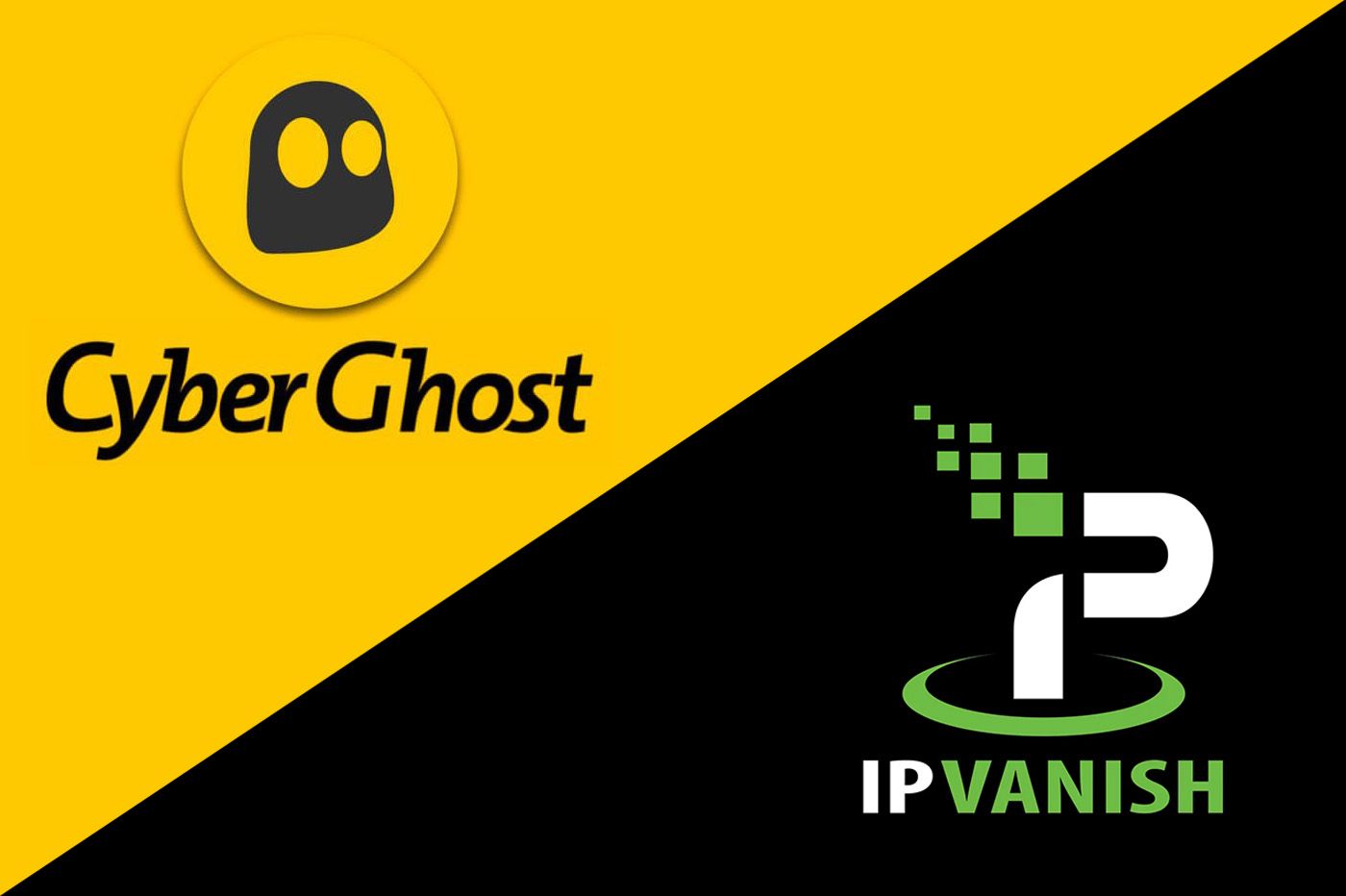
CyberGhost VPN vs IPVanish: Apps & Ease of Use
If you need a VPN for iOS, Windows, or perhaps Chrome OS, which provider should you get?
The answer is probably both. Checking their compatibility, CyberGhost and IPVanish offer native clients for all major desktop, TV, and mobile platforms. These platforms include:
- Windows
- macOS
- Linux
- iOS
- Android
- Chrome OS
- Firestick TV
- Apple TV
- Nvidia Shield, and so on…
IPVanish and CyberGhost VPN are easy to install and set up no matter which device you’re using. We also mentioned Linux on this list, and thankfully, both services support multiple popular distros. We like that CyberGhost offers several browser extensions for Firefox, Edge, Brave, and Chrome.
However, these extensions are free, so they’re not as good as ExpressVPN. Strangely, IPVanish lacks a VPN browser extension, which, for a premium provider, sounds silly. One thing that IPVanish does better is providing unlimited simultaneous connection as opposed to 7 for CyberGhost.
You’ll be able to protect way more devices with IPVanish, henceforth.
CyberGhost VPN
But let’s not rest on IPVanish’s laurels. The next sub-category is ease of use. CyberGhost’s desktop applications look fairly decent and their behavior is even better. They’re snappy and have short connection times, making the experience feel opulent.
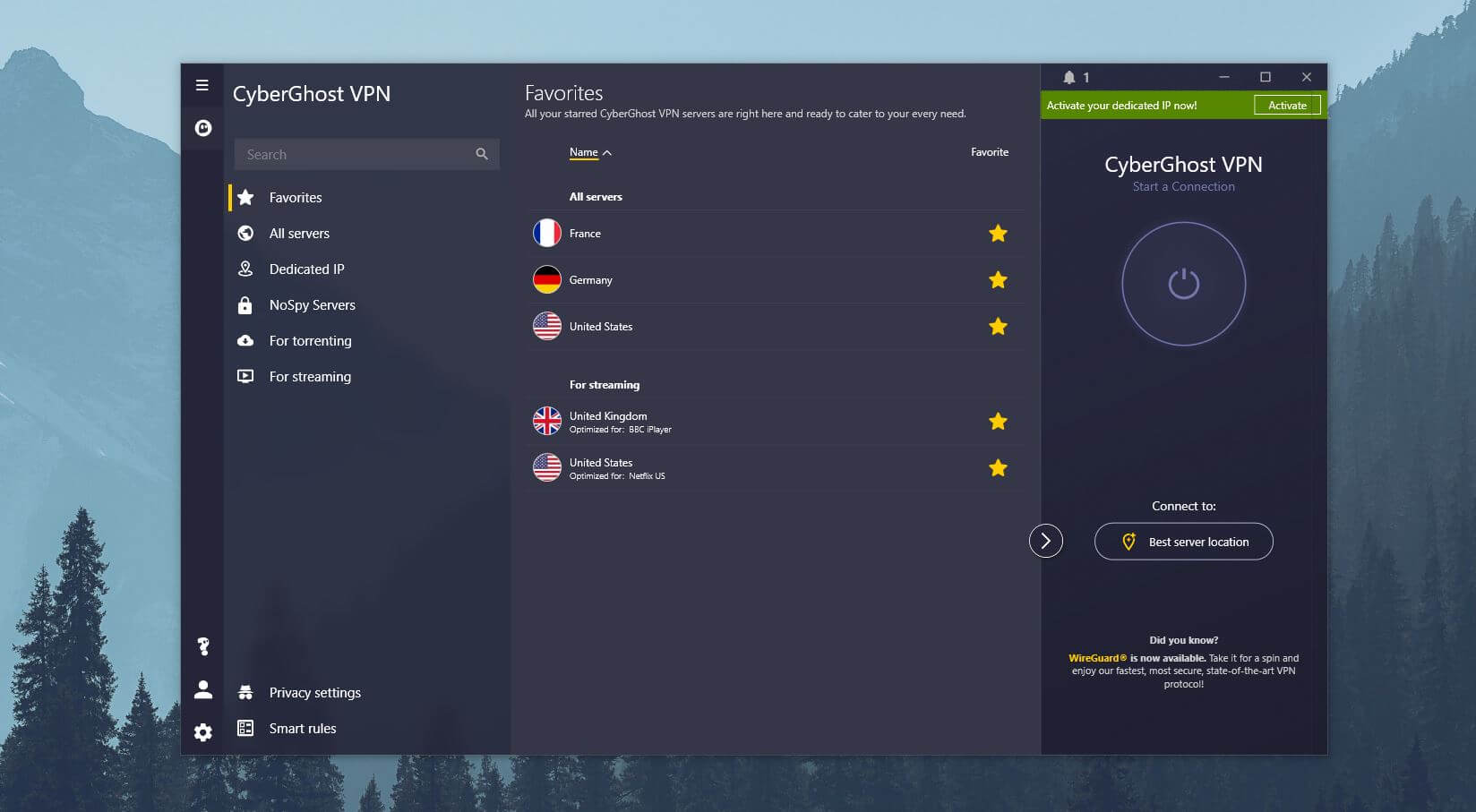
The left side houses several types of servers, including the entire server list. The servers are then displayed in the middle, while the connection button is on the right. CyberGhost will connect you to a particular location in 2 seconds, once you double-click on the one you want.
Also, the server list is in alphabetical order, with countries’ distances to you displayed next to them. How to use a kill switch here or enable more features? You can do so by going to the Privacy Settings menu, where you’ll also find an ad blocker. Smart Rules is reserved for split tunneling, for example.
Then, using the Gear icon, you can switch from a few protocols and tweak a few more options. Its Settings menus are a bit confusing, to say the least, but in a few hours, you should be accustomed to them. CyberGhost’s mobile apps are state of the art, however.
They’re extremely simple, offering even streaming servers along with WireGuard and full IP leak protection on both iOS and Android.
IPVanish
IPVanish’s applications looked dated. On the flip side, they’re, in our opinion, a bit simpler to use. That’s also because IPVanish doesn’t offer many features, so you have a handful of menus, and only one houses the most relevant VPN-related quirks.
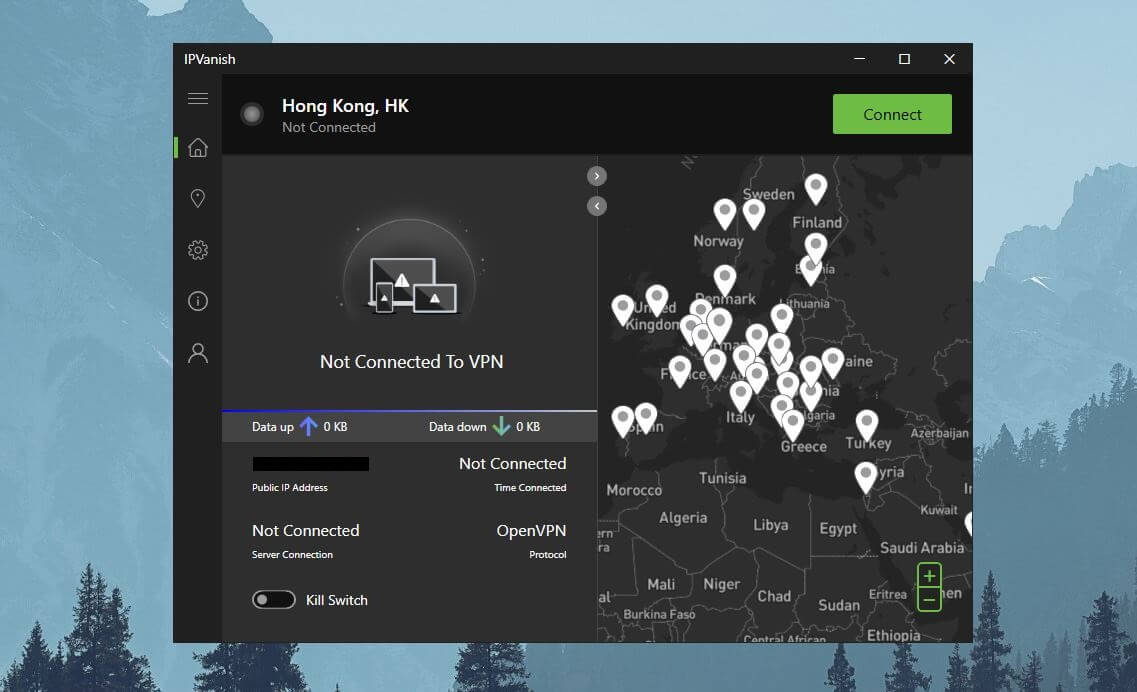
The right side holds a world map that looks like it belongs to the 1960s and was used by Indiana Jones. Jokes aside, the right side shows you your IP, other connection data, and a button to use the kill switch. The Quick-Connect button is in the top-right corner.
To open the server list, you’ll click on the Location icon on the right and then connect with a mouse click. Underneath is, again, the Cogwheel icon to access Settings. You won’t find much there, except for basic features that we already discovered in our IPVanish review.
It’s good to know that IPVanish is snappy too, which could be said about its mobile apps. They resemble a similar look but we still think they look a tad dated. Compared to CyberGhost, IPVanish is no doubt simpler but its aesthetics don’t scream premium at this point. It looks rather bland.
Who Wins?
So, which provider to get, CyberGhost or IPVanish? We can’t say for certain yet. However, the first round is a DRAW if that’s what you want to know. IPVanish is a bit easier to use, offering unlimited connections per account. CyberGhost looks better and has a superior mobile app.
Plus, CyberGhost has a browser extension, which IPVanish lacks. Let’s leave this at a draw and move on.
Security & Privacy: Which One Is Safer to Use?
A far more crucial round of this CyberGhost vs IPVanish duel is the one regarding security and privacy. Here, we have a heap of things to discuss, so read this section carefully, as there are some stark differences.
Security Features
Before exploring these differences, let us talk you through their identical features. As expected, IPVanish and CyberGhost offer 256-bit encryption, which is a staple of every premium provider. In terms of protocols, these providers are eerily similar. We get OpenVPN and WireGuard in both.
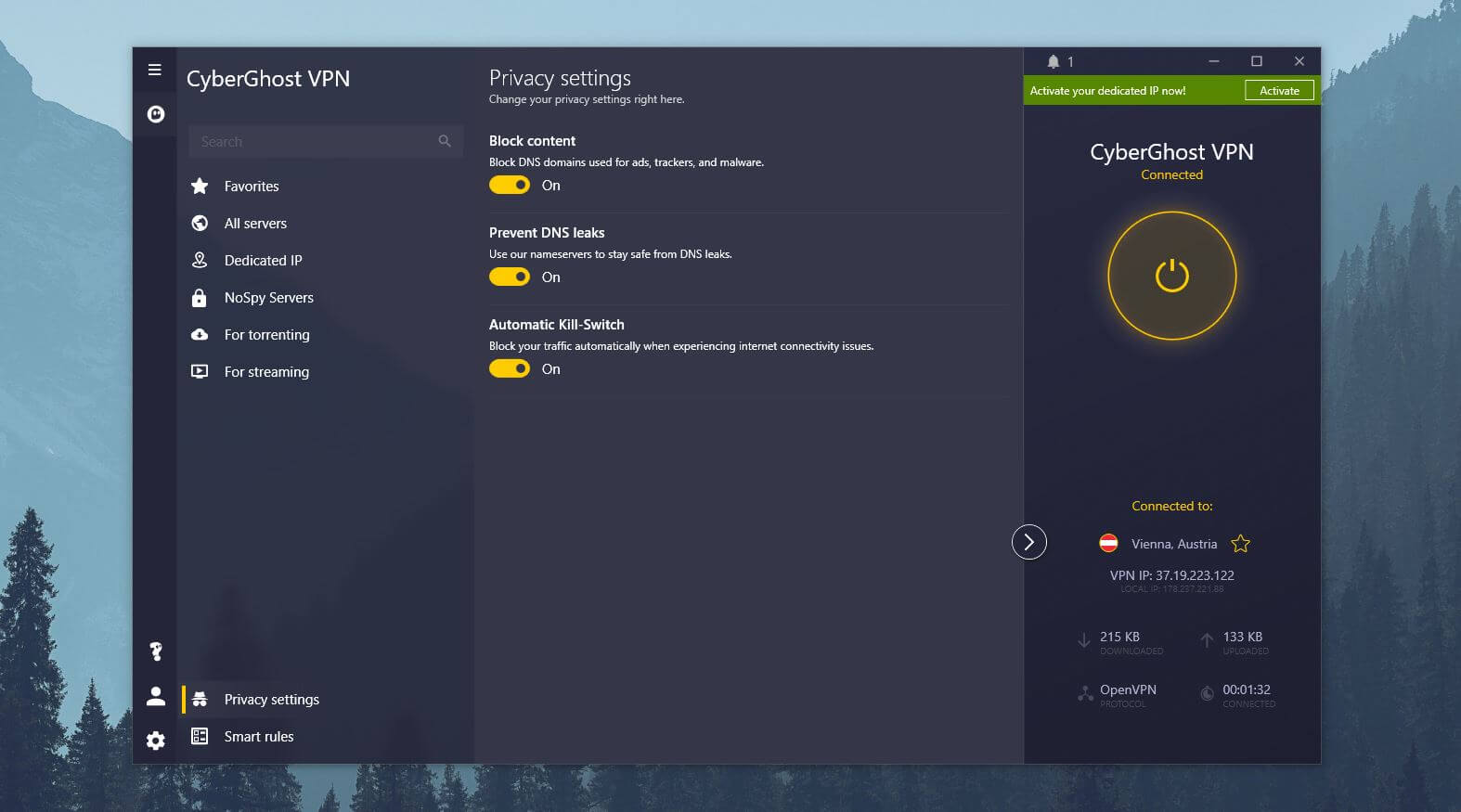
According to our CyberGhost analysis, WireGuard performs better in this VPN but more about that later. Other notable features include an automatic kill switch, split tunneling, and IPv6/DNS leak protection. No wonder you won’t experience any leaks in any of these.
What about RAM servers? IPVanish confirmed that its servers migrated to RAM – splendid news. CyberGhost made this step way before and now, all of its 10,000 or so servers rest on Random Access Memory, making things significantly safer.
Private DNS servers are used by IPVanish and CyberGhost, ensuring no DNS leaks will spoil your privacy. Since we briefly mentioned split tunneling, let us just explain that IPVanish offers the feature on Android only. CyberGhost, however, has it on all major platforms.
What Are the Differences?
This leads us to their differences.
You see, we already told you all about IPVanish’s security. This is all the US VPN offers. CyberGhost has plenty more, including an ad blocker, which blocks trackers, malicious sites, and of course – ads. Moreover, the VPN offers NoSpy servers.
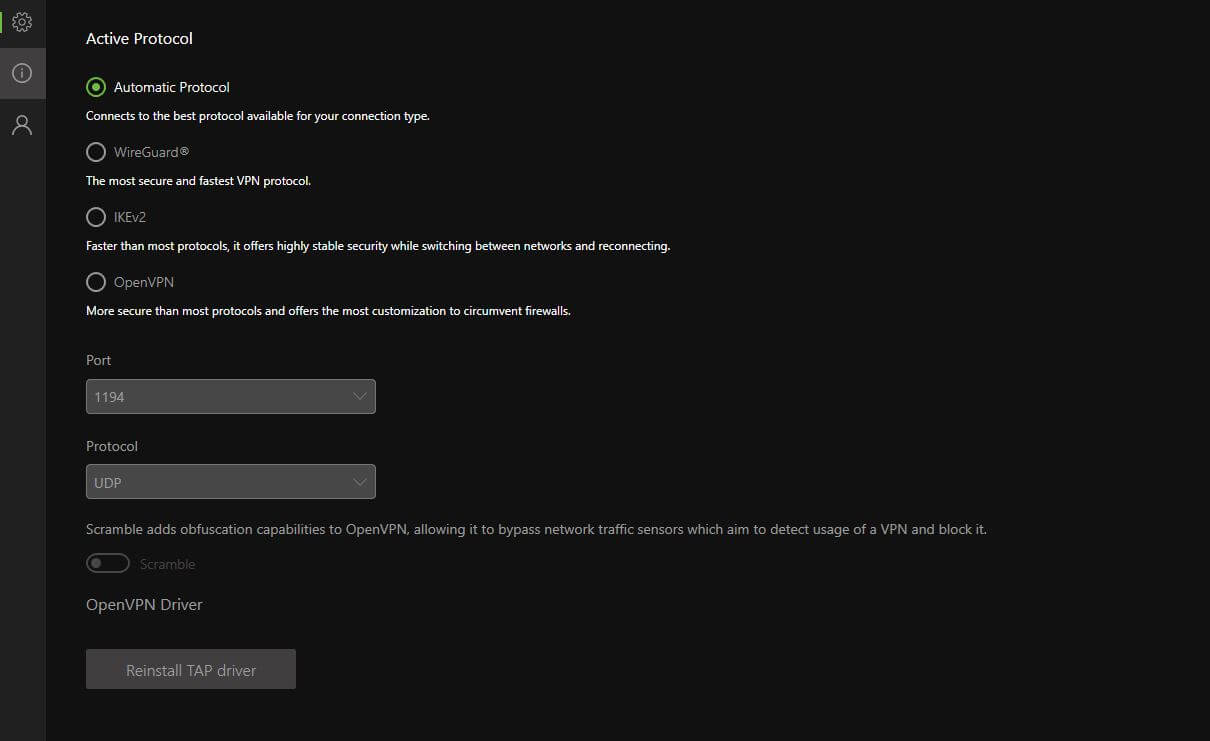
These servers are in Romania, where CyberGhost also resides. Unlike its third-party servers, NoSpy servers are owned by this company, which eliminates third-party server owners, thereby, ensuring you get additional privacy and security.
Another thing to point out is the IKEv2 protocol that iOS users have, in addition to bonus features that you can buy. For instance, CyberGhost’s antivirus and Security Updater come at $1 a month. Still, we’re discussing a capable antivirus solution that will protect your computer wonderfully.
The Security Updater function keeps your apps up to date, making sure no security vulnerabilities are there. A feature that both VPNs lack is obfuscation, however, but we’ll get into that later when talking about their ability to bypass censorship in China.
Is There a No-Logs Policy?
The last thing you want is to use a provider that stores logs. While every provider must store *some* logs, keeping things like online history and IP addresses isn’t necessary. In this part of our IPVanish vs CyberGhost comparison, we’ll see how strong these providers are privacy-wise.
IPVansh
At the moment of writing our CyberGhost vs IPVanish analysis, IPVanish’s privacy policy looks quite clean and to the point. Below, you can see that it stores no logs of your online activities, IP address, location, timestamps, and so on. We like that the provider gives you this short version of the policy right away, too.

Bear in mind IPVanish is in the US, so it’s under the 5 Eyes jurisdiction. At the same time, it has a security audit from Leviathan Security, which alleviates all worries. To remind you, VyprVPN was also audited by this company and is, as such, a safe and secure provider.
IPVanish’s troubling past is something we can’t forget. Its previous owner did a lot of bad for its reputation, as during this time, the VPN leaked connection data to the FBI to help apprehend a suspect. This was discovered later in the court documents.
At that time, IPVanish kept connection logs, which was said clearly in the privacy policy. That said, the company didn’t do anything behind users’ backs. It just had this fatal flaw that is now, hopefully, ever returning.
CyberGhost
CyberGhost doesn’t have a troubling past like IPVanish. It’s a Romanian VPN and Romania is very privacy-friendly.
Being outside of the 5 Eyes, CyberGhost isn’t subject to data-retention laws. On top of that, the provider vows to store no logs, which its privacy policy shows immediately.
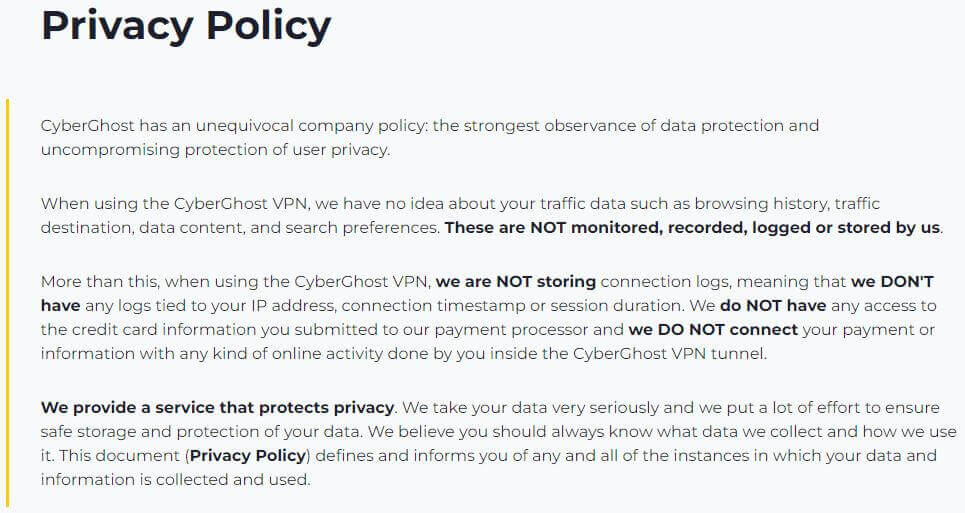
No IP addresses, timestamps, connection data, and other unnecessary logs are kept. Even your payment info isn’t collected by the provider and is used only to buy the service instead. Like IPVanish, it will store benign information related to troubleshooting – this doesn’t include any of the parameters above.
Good to know is that CyberGhost has two more things going for it. One is an independent audit from Deloitte, the same company that audited NordVPN and Surfshark. Another is the presence of transparency reports published every 3 months.
These reports are nifty, as CyberGhost openly gives out all information about its data requests from the authorities. Of course, it is proven that the service handed out no data, as it has nothing to store. Plus, its RAM-only servers house no compromising data, which is a win-win situation.
Who Wins?
In the end, CyberGhost WINS the second round against IPVanish. It offers more security features and an ad blocker that IPVanish lacks. Not to mention its more trustworthy privacy policy and better jurisdiction in Romania, which is more privacy-friendly.
IPVanish’s troubling past and the US jurisdiction aren’t the most trustworthy at first. While the VPN is safe now, the aforementioned scandals take away a bit of its value.
CyberGhost vs IPVanish Streaming Test
Streaming ability usually separates premium VPNs from those with lower quality. As discussed in our top free VPN list, these providers lack any streaming capabilities. IPVanish is a premium service but its streaming capabilities aren’t very good. During our tests, it unblocked Netflix US.
However, not much apart from this will work properly. BBC iPlayer can be unblocked with the UK server but if you’re expecting more platforms like Hulu or Disney+, you’ll be disappointed. IPVanish has no dedicated streaming servers either, which explains its poor performance.
The streaming quality is okay, so to speak. The provider isn’t blazing-fast but when it works, it works well. It’s a shame we couldn’t access Netflix Japan, for example, or even the Canadian catalog where we could find plenty of good movies and shows. This is remedied by using CyberGhost.
Its streaming servers are optimized for an array of platforms. For example, they work with all the aforementioned Netflix libraries, which is already an advantage. Servers for BBC iPlayer, Hotstar, Disney+, HBO, Hulu, and others are here and they all work.
We especially like CyberGhost’s ability to unblock TV channels, which can aid in streaming MotoGP races for free. Another benefit is the inclusion of SmartDNS, which helps you set up the VPN for streaming on any device, even older generations of Firestick TV.
In terms of overall streaming performance, CyberGhost is no doubt better than IPVanish. CyberGhost’s speeds are well known at this point and we’ll discuss them in the next section of this duel.
Who Wins?
For now, it’s vital to say that CyberGhost WINS the round by being a more capable option for streaming than IPVanish. This applies to both the performance and the array of streaming services it can unblock. Roughly, it’s at least 2-3 octaves above its today’s opponent.
IPVanish vs CyberGhost Speed Comparison
In the streaming part of this IPVanish vs CyberGhost duel, we mentioned that CyberGhost is a lot better even performance-wise.
Does that mean the provider is faster overall? That’s exactly what we’ll see now. First, let us tell you more about our testing parameters.
Our native internet speeds look like this without a VPN:
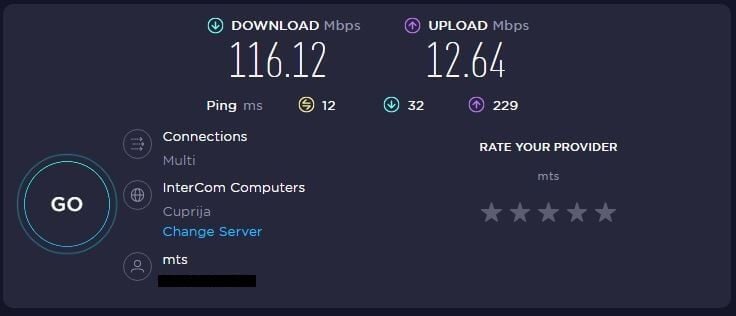
At the time of writing, we’re in Europe and for this CyberGhost vs IPVanish comparison, we’ll use 4 server locations.
They include the UK, the US, Australia, and Japan. Also, it’s worth noting that the testing procedure includes testing both VPNs for 3 days in a row, 3 times a day.
Finally, we’ll need to talk about the protocol we used. WireGuard or OpenVPN? Well, we just set this option to Automatic and let both VPNs decide what’s the best protocol for us. In most cases, both used WireGuard but occasionally, they switched to OpenVPN when they saw fit.
Bearing in mind everything we said, the results are these:
IPVanish
UK:
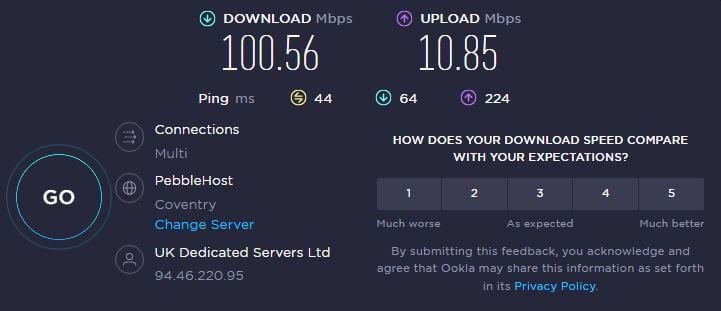
US:
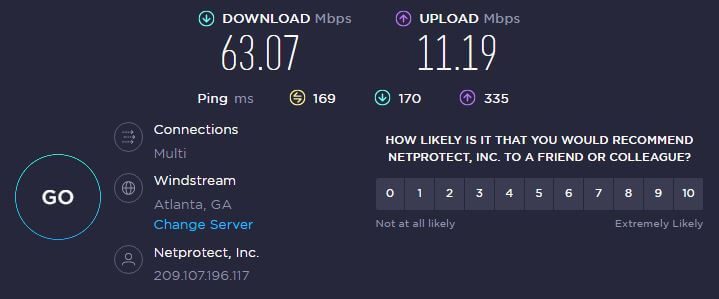
Australia:
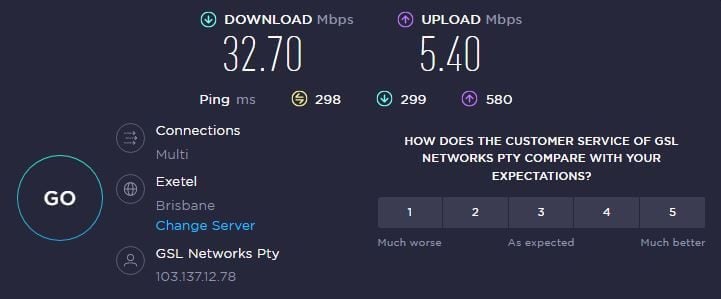
Japan:
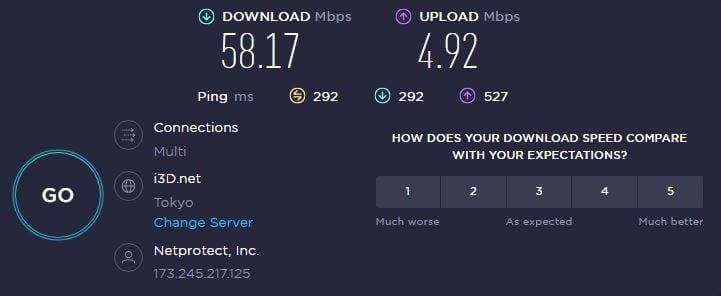
CyberGhost
UK:
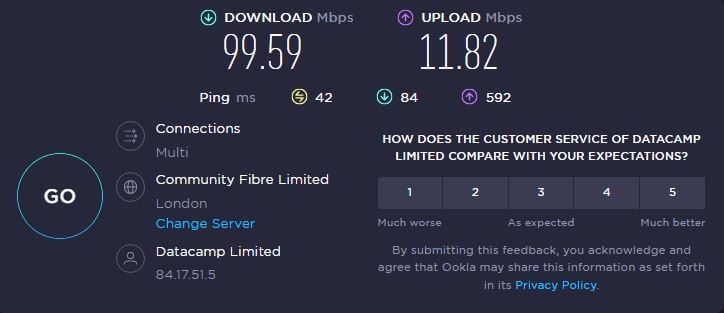
US:
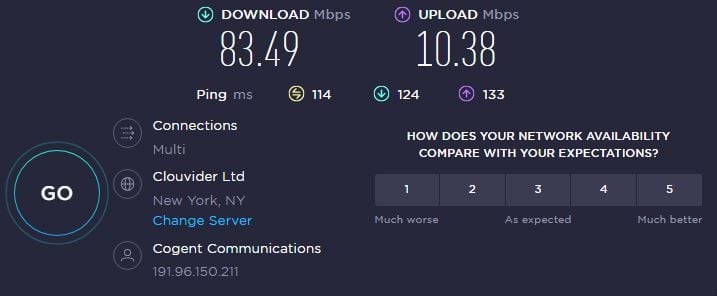
Australia:
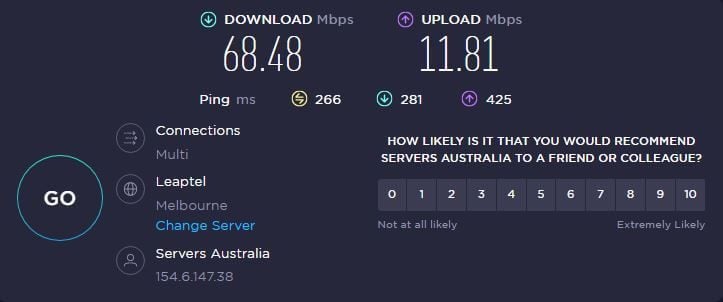
Japan:
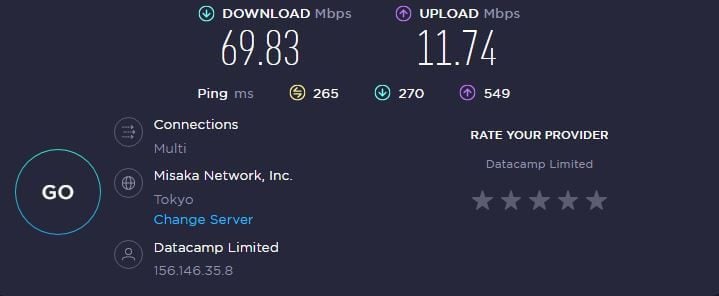
Who Wins?
Again, CyberGhost WINS this round against IPVanish and it’s clear why. While it’s pretty much on par with IPVanish when using the UK server, the situation is far better for the Romanian provider on all other servers. Take the US server as an example and you’ll see CyberGhost’s superiority right away.
It’s faster for downloading while being on par for uploading. CyberGhost also shows lower latency on average and is generally a more stable option than IPVanish. We don’t need to discuss the results that much. They already speak for themselves, and between IPVanish or CyberGhost, the latter is faster.
Torrenting: IPVanish VPN or CyberGhost?
CyberGhost has thousands of P2P servers that you can use for torrenting. This is welcome if you’re often performing these activities or simply transferring your files via P2P.
Regardless, these servers are available in more than 70 countries, so it’s easy to find one close to you.
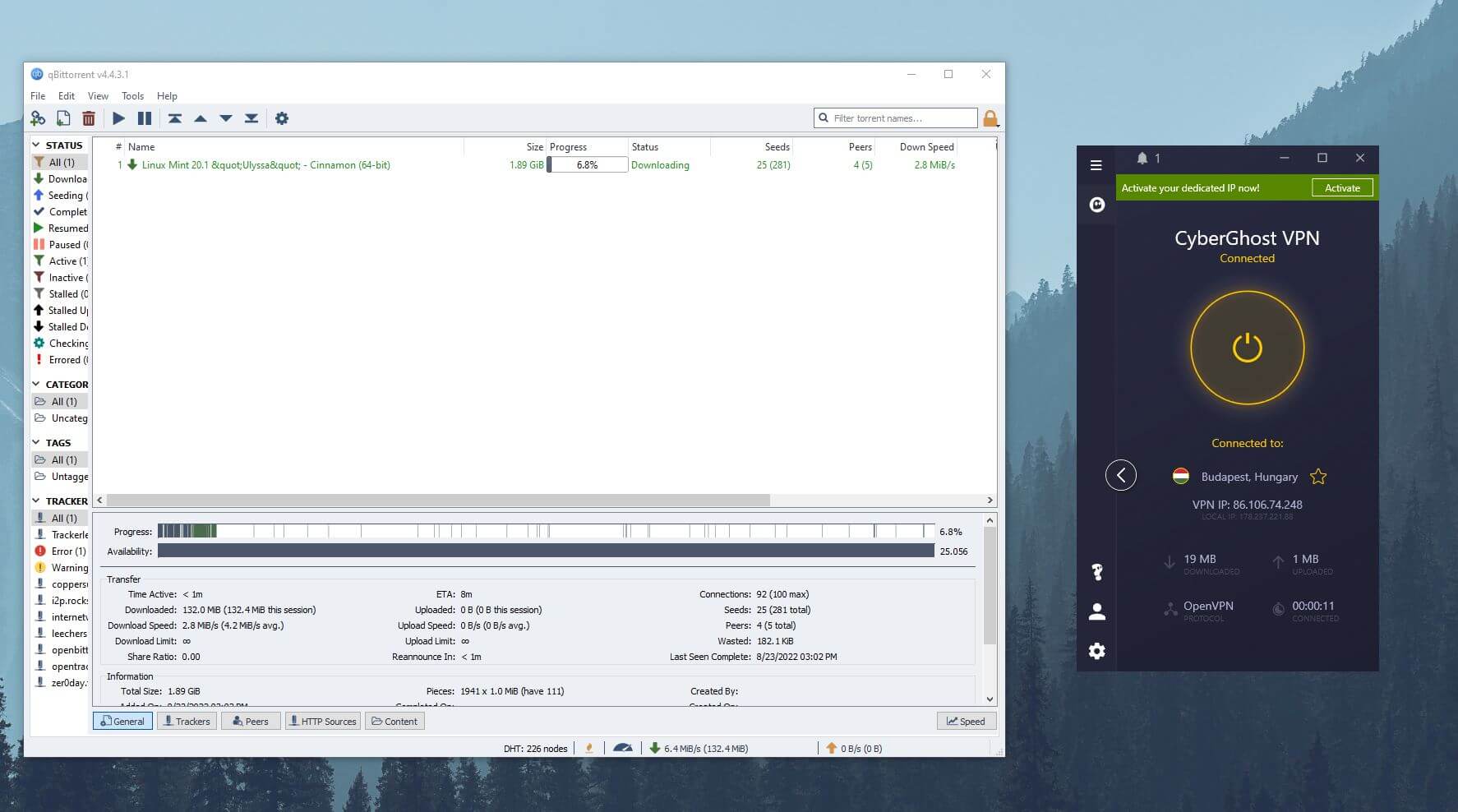
We used a VPN server in Hungary, which, as you see, provides a stellar torrenting experience. At the time of writing, the Hungarian server was close to use, hence, we noticed no speed reductions. Even better is that distant servers produce very little change to performance. If at all.
CyberGhost doesn’t include port forwarding or SOCKS5 proxy but in this case, we don’t think it’s necessary. The VPN is safe and secure enough, on top of which, it includes 10 Gbps servers, making torrenting a breeze. In short, you’ll face zero issues with it.
We could say the same about IPVanish. It’ll conceal your traffic and encrypt your connection so that you can perform all activities anonymously. This includes torrenting, which, from our testing, seems to be working on all servers. Again, dedicated P2P servers aren’t here.
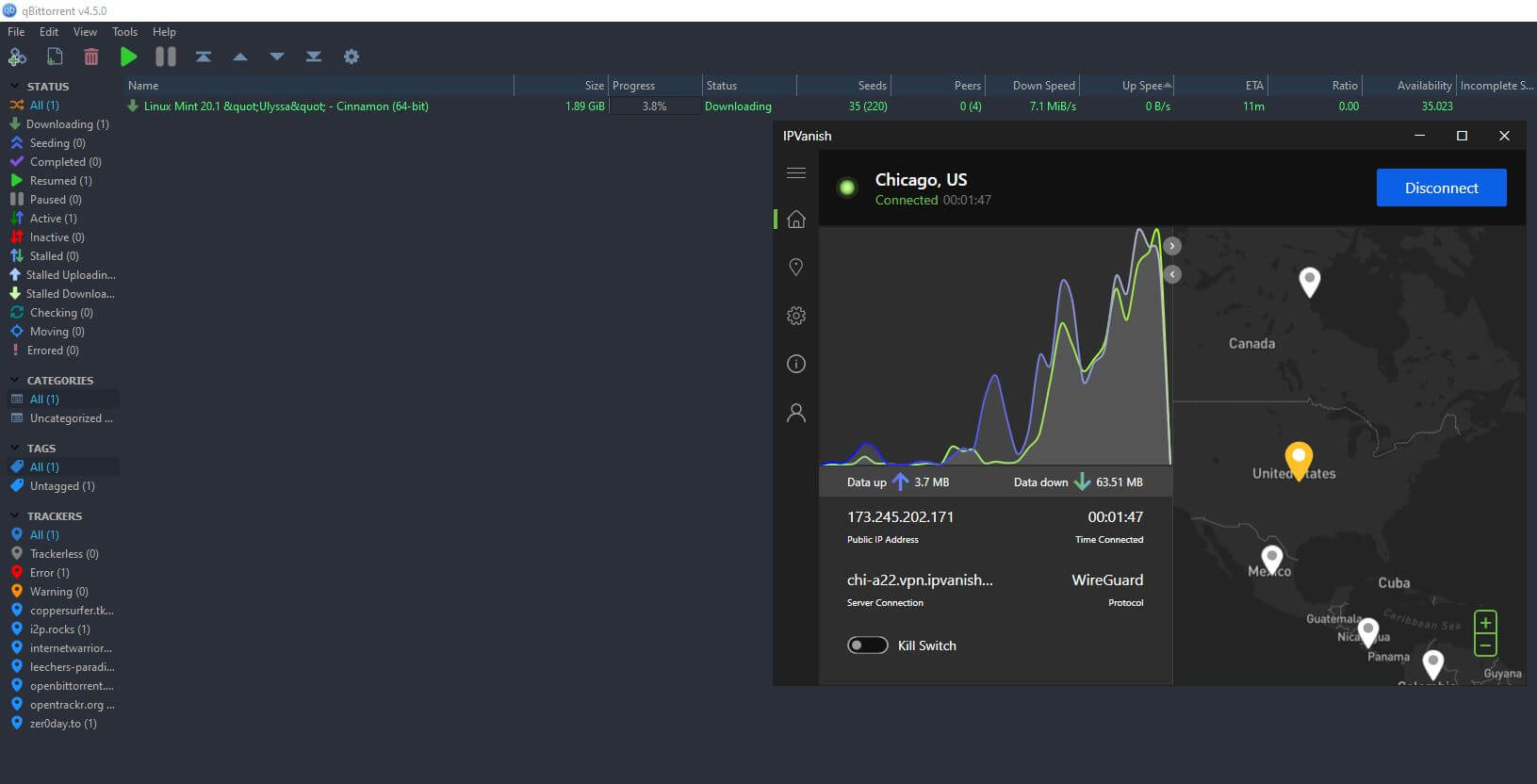
Instead, the entire fleet is capable of torrenting, so you just have to pick the location. IPVanish, like CyberGhost, keeps no logs, so it’s both safe and fast for this purpose.
Who Wins?
Eventually, we expected to see equally good results in this round of our IPVanish vs CyberGhost analysis. Having said that, the round is a DRAW, as both providers are capable of providing a fast, safe, and anonymous torrenting experience.
Are CyberGhost and IPVanish Working in China?
When it comes to working in China, very few providers can boast about being excellent. So which one should you use in this country, IPVanish or CyberGhost? Unfortunately, neither.
One would think that CyberGhost can replace IPVanish in this regard because it’s better so far.
Well, the provider doesn’t offer obfuscation, which is the main downside. Obfuscation masks your VPN traffic to make it look like “normal” traffic instead. It’s used to bypass deep-packet inspection implemented by China and many other censored countries.
As a result, despite our testers’ valiant efforts, they couldn’t make it work in China. IPVanish behaves the same, however. It doesn’t offer any form of obfuscation and if this Scramble function is meant to be that, something obviously isn’t working right. In that case, which provider should you use instead?
Our favorite VPN for China is ExpressVPN. It works infinitely better with its Lightway protocol and state-of-the-art obfuscation. Then, there’s NordVPN with obfuscated servers that many in China enjoy without problems. Finally, you can also try Surfshark and its NoBorders features.
While Surfshark is a bit less reliable in China, it offers unlimited connections, so it’ll protect all your devices. CyberGhost and IPVanish are yet to implement obfuscation and we hope it’ll be soon. Otherwise, their values will plummet dramatically, especially for those in censored countries.
Who Wins?
For the second time in a row, we have a DRAW between IPVanish and CyberGhost VPN. However, not in a good way. Neither of them works in China, hence we can’t recommend any of them.
You can use them in the UAE, Qatar, and Russia, for example, but more censored countries will call for ExpressVPN or NordVPN.
CyberGhost vs IPVanish Server Fleets
We always value when the provider has quality-crafted servers. But when these servers excel in quality and quantity, it’s even more impressive.
Let us blitz through these providers’ server networks and see what they have to offer.
CyberGhost (10,000+ servers in 100 countries)
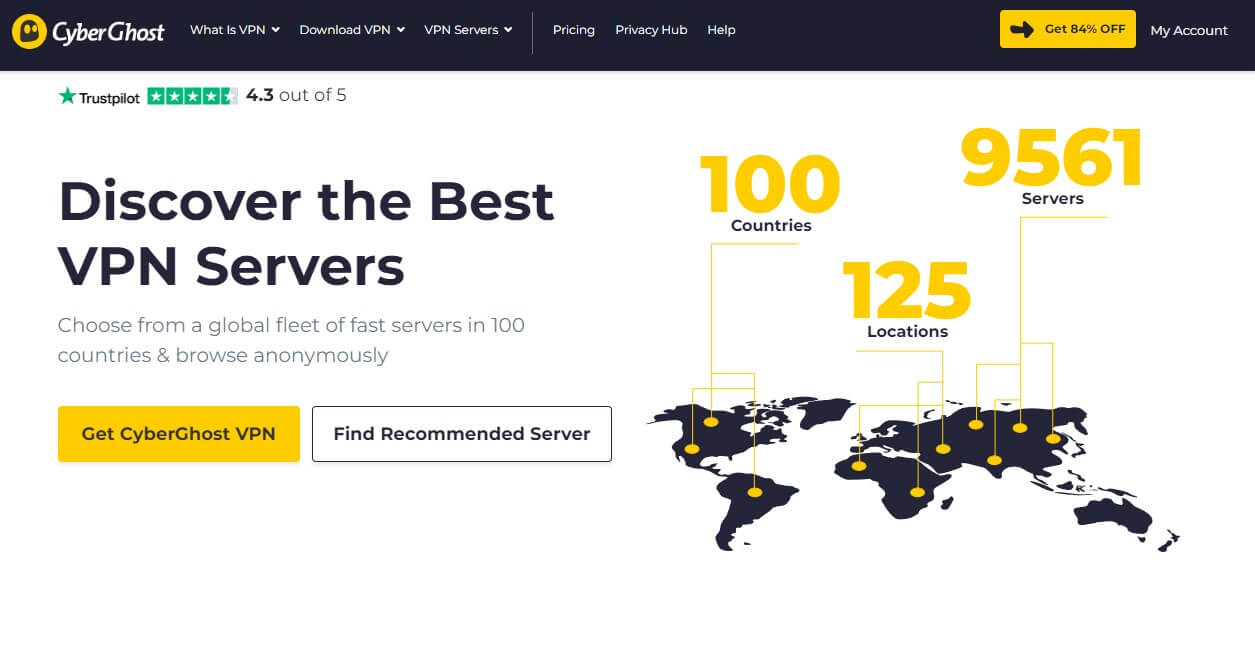
CyberGhost increases its server fleet pretty much each month to the point it’s pointless to talk about the number of servers. Yeah, at the moment, there are 10,000+ of them in 100 countries and 125 locations. That won’t be the same the next month when we’ll surely see more servers.
Regardless, it’s hard to beat CyberGhost in terms of sheer size. It’s MASSIVE, with streaming/torrenting servers to complement the size, plus the aforementioned NoSpy servers. All servers are based on RAM and we’re talking about a fast 10 Gbps infrastructure that keeps these servers fresh and modern.
CyberGhost even offers a plethora of dedicated IP addresses in 10+ locations. They’re incredibly cheap at a speck above $2 and provide additional benefits like avoiding captcha puzzles and IP blacklisting.
The server distribution doesn’t need a wall of text. You can expect the service to offer a boatload of servers across the entire world. The US, the UK, Australia, Canada, Japan, Europe, Asia, and Africa – CyberGhost covers all of these regions with fast, safe, and secure servers.
IPVanish (2,200+ servers in 49+ countries)
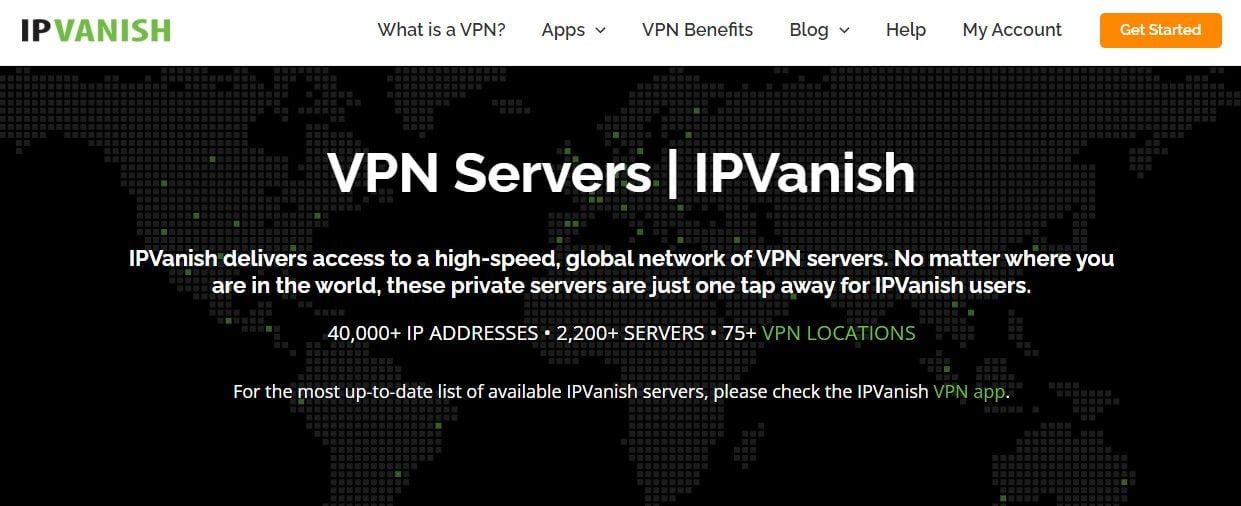
With 2,200+ servers in 75 locations and roughly 50 countries, IPVanish is all but unimpressive.
However, in this IPVanish vs CyberGhost duel, we can’t help but think just how small the American VPN is in comparison. It offers about a 5 times smaller server network in 2 times fewer countries.
These servers have no specialties, which makes them look “ordinary.” Unlike its rival, this provider has no streaming, torrenting, or any other servers. We do know they’re 10 Gbps, which is reflected in the level of performance and they’re all based on RAM.
Still, we’re disappointed with the lack of dedicated IPs. The server distribution is all right for this server fleet. North America houses 1,400+ servers, while Europe has around 560+. We like that the provider has a presence in Asia and South America, in addition to Australia and New Zealand.
You can get an IP from New Zealand but also enjoy many servers in the UAE and Hong Kong. We don’t know which servers are virtual and which are physical, which is a bit annoying. CyberGhost is more transparent, giving you full information about the type of servers it’s using in particular locations.
Who Wins?
CyberGhost WINS this round for one simple reason – it’s more equipped with servers than IPVanish. Even if we take this away, it offers more locations, specialty servers, and dedicated IP addresses. Simply put, everything server-related is better in CyberGhost than in IPVanish.
Customer Support: IPVanish or CyberGhost?
On the customer support side, we can say that both are stellar. 24/7 live chat support is on both sides, albeit, we found CyberGhost slightly more responsive. It’s also available in multiple languages, such as English, German, and French, making it a tad more approachable.
IPVanish comes with 24/7 support through live chat but you’ll be first greeted by a bot. You can immediately get in touch or send an email. Speaking of which, email support on both sides is okay but again, CyberGhost is faster to respond in most cases.
FAQs and guides are present in both providers but CyberGhost is more comprehensive and in-depth. You’ll find so many guides and answers to questions that you won’t even need to contact support. IPVanish and CyberGhost have Blog sections where you can read a few articles and learn something new.
But as expected, these Blog sections aren’t usually noticed by VPN users who frequently ignore them or don’t see them at all.
Who Wins?
The customer support round is almost equal but because it’s more responsive and more helpful overall, CyberGhost WINS the round by a tiny margin.
CyberGhost vs IPVanish Pricing Comparison
Before we call it a day, it’s good to check the prices of both VPNs.
Bear in mind we’re discussing their actual prices, which might not be the same when you’re reading this article. They likely won’t be very different but if you see different deals on your end, don’t be surprised.
CyberGhost
This time, we’ll start with CyberGhost as the provider “notorious” for insanely cheap prices.

Would you look at that? The provider has a ridiculously good 2-year plan with 2 free months at just under $2.2 a month.
Since it’s paid upfront, it’s just shy of $57 for the first 2 years. Not to mention its remarkable 45-day money-back guarantee which no other VPN will give you.
Its other plans include a monthly deal at $12.99 and a six-month deal at under $7 a month or around $42 every six months. These plans aren’t very affordable, hence, we can’t recommend purchasing them. The provider offers a litany of payment methods, including credit cards, PayPal, and crypto.
Its renewal price is surprisingly cheap too. Once the first 26 months expire, you’ll be paying the same price but annually. This ends up being below $4.8 a month, which, for the annual plan, is far below what ExpressVPN will charge you.
IPVanish
IPVanish or CyberGhost? Which one saves you more money? The answer is below – here’s how much IPVanish costs:

As you can see, the monthly plan costs the same. Then, there’s the annual plan at $4.49 a month or around $54 for the first year. Finally, the cheapest deal, one in the middle, is the 2-year plan at $3.33 a month or $79.99 for the first 24 months.
No doubt, IPVanish is more expensive, plus, its longest plan doesn’t include any free months. $3.33 and $2.22 are very different prices and upfront, this VPN will charge you around $23 or so more. What’s the renewal price, you’ll be asking? Well, they’re MUCH higher.
For example, the annual plan renews at $89.99 a year, while the biennial plan is a whopping $179.99 every 2 years. This makes the monthly cost of this service around $7.5 a month, which sounds insane, given that ExpressVPN costs less and offers way more.
The refund policy is also different. It’s a 30-day refund policy but only for annual and biennial plans. The monthly plan isn’t subject to a refund policy, so you can just cancel it but not get your money back.
Who Wins?
The final round gave us clear answers regarding the prices of CyberGhost and IPVanish. CyberGhost WINS easily by not only being cheaper BUT also offering way more value for the money than IPVanish. In the long run, it’s also cheaper because of lower renewal prices, which could be relevant for many users.
Conclusion: CyberGhost Wins!
Drawing from our extensive testing in this CyberGhost vs IPVanish duel, we can conclude one thing. CyberGhost wins with a score of 9:3 and is a better provider overall. IPVanish offers unlimited simultaneous connections, it’s safe and comes with solid customer service.
CyberGhost, on the other side, offers much more. Apart from being a safer and more trustworthy VPN, it’s remarkable for streaming and torrenting. Its native Onion Over VPN integration is also phenomenal and the VPN includes NoSpy servers that you won’t find in IPVanish.
Not to mention its dedicated IPs, faster speeds, better performance on Netflix, and superior customer service. The final nail in the coffin for IPVanish is that CyberGhost is way more affordable. Why pay more for a worse provider? It makes no sense to get IPVanish in that case.
It, however, makes perfect sense to get CyberGhost. Don’t hesitate to do so through our site where you’ll be able to snatch an exclusive discount and save more than 80% on the initial monthly price. For this amount of money, finding a better VPN is incredibly difficult, or better said, impossible.